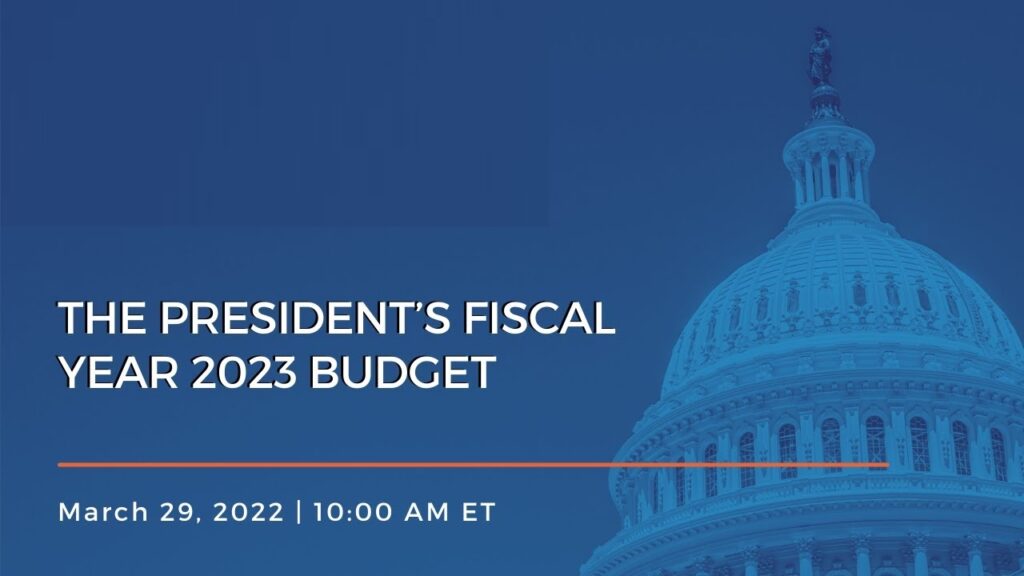The President’s Fiscal Year 2023 Budget

President Biden has a strong faith in the ability of the United States to lead the world in finding solutions to problems, and the administration agrees that diplomacy and development are essential tools for furthering American interests and values. Due to this, the President’s Budget for Fiscal Year 2023 requests $60.4 billion for the Department of State and the United States Agency for International Development (USAID), which is $7.4 billion (or 14 percent) more than what was enacted in Fiscal Year 2021 and $1.9 billion (or 3%) more than the Fiscal Year 2022 Request. We can promote our foreign policy agenda and serve the American people with these resources.
Also Read:- California City & County Sales & Use Tax Rates (effective October 1, 2022)
The Budget will fund a range of Department of State and USAID priorities, including:
Support for Ukraine and Our Allies and Partners in the Region
The Request contains $1.6 billion to help Ukraine defend itself from Russia’s planned, unprovoked, and illegal invasion as well as help other nations in Central Asia and Europe who are endangered by regional instability. The Request helps our allies and partners significantly while enhancing their ability to fend off attacks from bad actors.
Affirming U.S. Alliances and Renewing U.S. International Leadership:
The Request upholds long-standing commitments to significant partners, advances peace, prosperity, and security in Europe and the Indo-Pacific, expands diplomatic and development efforts in Africa and Asia, and puts us in a position to successfully compete with the People’s Republic of China (PRC) and Russia. The United States’ leadership is affirmed by this request, which includes $4 billion to uphold American commitments to international institutions at a time when our rivals are looking to increase their influence.
Addressing the Climate Crisis:
The Request includes $2.3 billion to support the United States’ diplomatic leadership in addressing the existential climate crisis, scaled-up international climate programmes that hasten the world’s energy transition to net zero by 2050, assistance to developing nations to strengthen their climate resilience, and the prioritisation of climate adaptation and sustainability principles in Department and USAID domestic and international facilities.
Strengthening Global Health Systems:
In order to improve global health outcomes for the American people as well as millions of other people worldwide, the United States is the global leader in this field. In order to continue working with international partners to invest in cross-cutting health systems to reduce child and maternal deaths, fight infectious illnesses, and control HIV/AIDS, the Budget asks for $10.6 billion in Department and USAID financing.
Revitalising Alliances and Partnerships in the Indo-Pacific:
The Request includes $1.8 billion to implement the Indo-Pacific Strategy to support a free, open, connected, secure, and resilient Indo-Pacific Region as well as an additional $400 million for the Countering PRC Malign Influence Fund to strengthen and modernise America’s alliances and partnerships in a crucial global region and affirm U.S. leadership in strategic competition (CPMIF).
Defending Democracy Globally:
The Request has more than $3.2 billion to advance democratisation, safeguard universal human rights, strengthen anti-corruption work, and increase programming that fosters inclusive, legitimate, and effective governance – in line with the commitments made during the President’s Summit for Democracy. This is in response to the rise of authoritarianism around the world.
Promoting Gender Equity and Equality Worldwide:
The Request contains $2.6 billion, more than tripling funding from the FY 2022 Budget, to enhance gender equity and equality across a wide range of industries. For the Gender Equity and Equality Action (GEEA) Fund to enhance the financial security of women and girls, this includes providing $200 million.
Revitalizing and Expanding the Diplomatic and Development Workforce:
With the help of this request, the Department and USAID would be better equipped to find, keep, and grow a diverse, dynamic, and highly talented workforce to meet the challenges of the twenty-first century. It promotes diversity, equity, inclusion, and accessibility; it aids in possibilities for professional growth; and it increases capacity in vital new fields like cyberspace and cutting-edge technology.
These wise investments are made in the budget request, which also lowers deficits and boosts the long-term budgetary picture for our nation.
The new 2022-2026 Joint Strategic Plan (JSP), a four-year joint plan that serves as the key State and USAID strategy for accomplishing our foreign policy and development priorities in both organisations, is also being released today by the State Department and USAID. The JSP is structured around five objectives, which are also reflected in the Request: reinvigorating U.S. leadership and mobilising coalitions to address the global challenges that have the greatest impact on Americans’ security and well-being; promoting global prosperity and creating an international environment in which the United States can thrive; strengthening democratic institutions, upholding universal values, and promoting human dignity; and
The Department will release the 2022 Capacity Assessment for Research, Evaluation, Statistics and Other Analysis as well as the Annual Evaluation Plan concurrently with the Joint Strategic Plan’s release and in support of the Foundations for Evidence-Based Policymaking Act of 2018. In April, the Department will publish its first enterprise-wide learning agenda. These three documents work together to advance learning and the development of evidence in the achievement of the goals outlined in the Joint Strategic Plan.
Disclaimer:- All the Infrormation are taken from the offically wensite www.state. gov We Third Part Website we may not interrelation with this information You can also check all information on the offically govt. website








